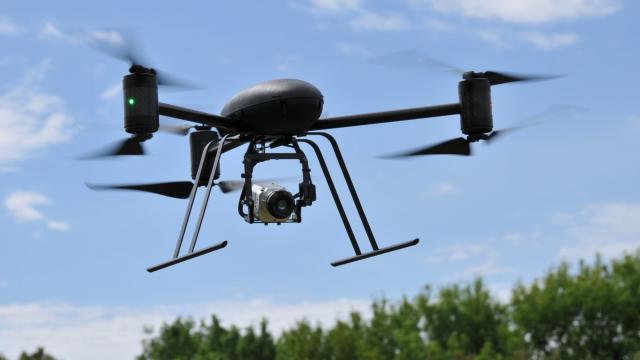
As of last year, 1,428 public institutions have received permits from the FAA to use unmanned aerial vehicles (drones)—including the State Department, various law enforcement agencies and universities (see a map of active permit holders here). Now two New York Assemblymen have introduced bills that would sharply limit the use of drones by law enforcement agencies in the state.
The first bill, drafted by Bronx Assemblyman Luis Sepúlveda, prohibits authorities from using a drone to gather evidence "except when authorized under a warrant issued by a court of record or justified by lawful exception to the warrant requirement." In the memo accompanying the bill, Sepúlveda states that such an exception would include "hot pursuit, emergency, et cetera."
Assemblyman Sepúlveda, did not immediately return a phone call for comment, but in a statement, says that his bill is merely the first of several bills he intends to propose with relation to drones. Others would include:
Banning drones from being armed; clearly defining what constitutes a drone; restricting the use of drones by private citizens; and streamlining the mechanisms to secure permits for responsible drone usage concerning its commercial applications.
Brooklyn Assemblyman Nick Perry introduced his legislation one day after Sepúlveda, and it is considerably more expansive. Perry's bill allows law enforcement to use drones to conduct criminal investigations, but requires agencies obtain a warrant before beginning any surveillance. Perry does provide for "exigent circumstances" under which law enforcement may utilize drones.
The bill also allows for civil actions "against a law enforcement agency to obtain all appropriate relief in order to prevent, restrain or remedy a violation of this section."
Perry's bill also allows for the use of drones "by a person for lawful purposes, including recreational or hobby purposes," a provision that mirrors current federal law. Commercial use of drones is currently prohibited until 2015, but the prohibition is widely ignored and not enforced.
The NYPD sought to obtain a drone in 2011, but spokesman Paul Browne told the Post, “We’ve looked at drones but haven’t deployed any."
Kenneth Thomas, chief of staff to Assemblyman Sepúlveda, explained that their bill did not require law enforcement to obtain a warrant in every instance because they wanted to make the language more palatable to lawmakers and increase the likelihood of its passage through committee.
"We're trying to be very careful with the language, but we want assess the position of the ACLU, to assess the NYPD's position, so we kept the language nebulous," Thomas said, stressing that they plan on introducing more legislation to address different aspects of the drone issue. Thomas added that their lack of involvement with Perry's bill and vice versa was "a miscommunication."
When asked to explain the broad powers Sepúlveda's bill would grant the NYPD in the use of drones, especially with regard to "emergencies" or exceptions for terrorist threats, Thomas said, "Certainly that's a concern. Our district is in the Bronx, so we're very accustomed to the privacy concerns of our constituents in relation to the NYPD, which are justified in many cases.
"But we don't want to preclude law enforcement from using the technology, so we're just being very careful with the language."
Assemblyman Nick Perry cited the need to be "proactive" on the issue of drones because "generally, the law does not keep pace with scientific developments."
When asked about the "exigent circumstances" under which law enforcement would be able to use drones in his bill, Perry said:
It's sort of like, in the Patriot Act, there's an ability to act very quickly. I think we have to be mindful of the fact that where there is reasonable suspicion and swift action is necessary, we do provide that possibility for the use of drones. We have to be realistic when we draft legislation.
Perry added that this is only the first draft of the bill, and that revisions are likely.
3 WAYS TO SHOW YOUR SUPPORT
- Log in to post comments











